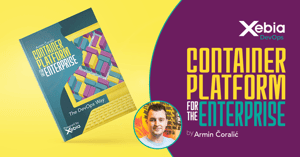Many companies are currently considering or already implementing (Cloud) platform technology. The major vendors in the current market make it easy to launch a Cloud platform. But to be honest, opening the AWS/Azure/Google online portal and enabling Kubernetes doesn’t mean you have a container platform. This is just the tip of the iceberg, a very small portion of the actual work. And it will also show you only a small share of all the benefits you can earn from working with a container platform.
Some advice from an independent expert
Finding structured guidance is difficult. And how do you make sure it is proven? - I have been working as a Consultant in the IT industry for a long time, mainly focusing on Cloud and platform technology during the last years. I may say that I’ve helped several of the biggest Dutch corporations move to the Cloud. I have seen tools from Docker and Kubernetes grow from an innovative niche tool to a main player in the Enterprise environment.

To share my experience with you and prevent you from mistakes that have been made elsewhere, I have written a book: Container platform for the Enterprise https://leanpub.com/cpe. All tips & tricks are purely based on my observations, and I do not have any objective in promoting one certain tool or supplier.
Is it really all about tech?
One important aspect of implementing container technology within your IT organization is the aspect of knowledge. Having said that, the question becomes: What kind of knowledge does your organization need to have to be able to successfully build, maintain, use and benefit from it?
Agile and DevOps are considered highly effective enablers of container platforms as they focus on agility and autonomy which is what containers are all about. Working in an Agile way will allow development teams to react to changing business requirements much faster. But changing the backlog won’t provide any value yet. This is where DevOps is joining the party. Product teams who are equipped with a higher level of autonomy and freedom will bring new features to production more swiftly. Real-time performance analysis of the new features and mirroring this to the business, will shorten the feedback cycle. This way, business teams can make more and better decisions for the future.
A container platform adds the magic sauce to this way of working. It will deliver all the flexibility and support to your development teams to work more efficiently and sustainably.
What about Kubernetes?
Having read about container technology and clusters, you will of course have come across Kubernetes. This orchestration software appears to be the cornucopia for container platforms on the one hand, but it also turns into a bottleneck on the other. Engineers with Kubernetes expertise are rare, the talent market is overheated, making it difficult to hire and develop the required knowledge within your team. So, why is this so important?
As mentioned before, your (Cloud) platform itself can already enhance the benefits of Agile and DevOps significantly. But the more craftsmanship and knowledge you have incorporated in your development teams about containers, Kubernetes, cloud and security, the more efficient they can become in leveraging the platform they are working on.
Even if the platform operates self-healing and can be maintained in a super easy way, there is going to be a need for innovation or experiments required to be executed by the development teams themself. Knowing how to adjust the applications to leverage the platform or deployment strategies gives the development teams a lot of ways to improve. It will not only simplify their daily work but also the actual operations when running in production.
How to become the conductor of container orchestration
 Like in an orchestra, leveraging the benefits of a container platform is like playing a symphony with many different parts. It is necessary to define required expertise and responsibilities on a team level.
Like in an orchestra, leveraging the benefits of a container platform is like playing a symphony with many different parts. It is necessary to define required expertise and responsibilities on a team level.
To set up a container platform team and surrounding supporting teams, they will need knowledge about the cloud, security, containers, in-depth Kubernetes and everything around it.
A container platform is not only Kubernetes. It is a combination of services provided on top of Kubernetes, and integrated tools and services around Kubernetes. In an ideal world, these are integrated in current organizational processes and tools, making it easy to follow the best practices.
You can easily lift on the Kubernetes community and vendor tools, they can simplify a lot of day-to-day work:
- operations work,
- production stability,
- experimentation,
- security and compliance.
If you want to read more about how a container platform can help you out, how to build one and what are the first steps to take, please look at Container platform for the Enterprise https://leanpub.com/cpe.
If you want to learn more about platform development and the knowledge gap, join me at my webinar during the Xebia Academy Webinar week





